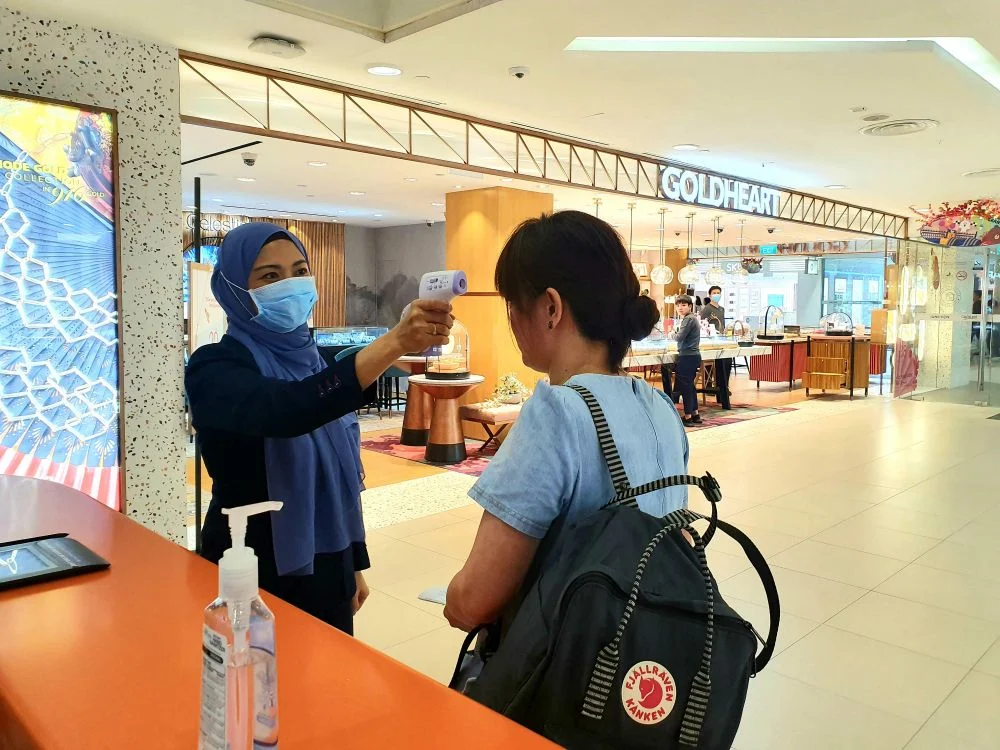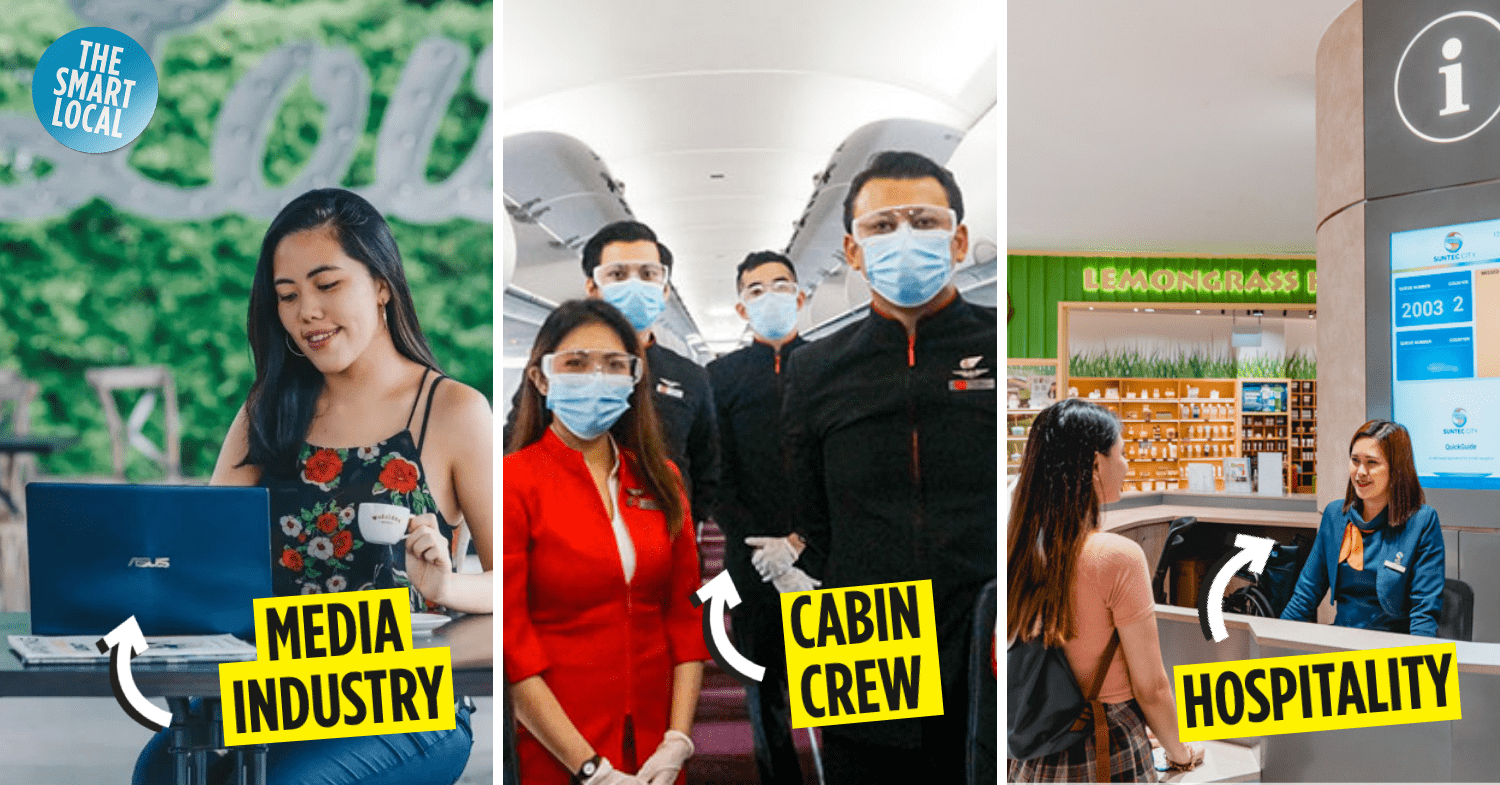Retrenchment in Singapore
If you haven’t been living under a rock in 2020, you’d know by now that our economy is not exactly in its best state. Rocked by COVID-19, it’s seen many Singaporeans affected by pay cuts, forced leaves and retrenchment.
But every cloud has a silver lining. Despite losing their full-time jobs due to the pandemic, these 7 Singaporeans we spoke to shared some life lessons they uncovered along the way and what their next steps are.
1. Set aside at least 6 months of income to tide over uncertain times

With travel bans and restrictions imposed, perhaps the most immediately affected industry was that of aviation. For Lena Koh, a cabin crew of 2 years, being let go was too sudden. “I felt devastated, but I understood that retrenchments were necessary to help the company tide over this difficult period”, she shared.
“The most important life lesson that I learnt is to always be financially ready for difficult times. I think it’s very easy to live in the moment, but when you’ve reached a certain age, you will realise how important it is to set aside savings that can help you tide over periods of uncertainty. As a general rule of thumb, I always made sure to set aside 6 months worth of my income to ensure I have finances to fall back on”.
Being let go also came with other opportunities from the help of her employer. “I was linked up to the SGUnited Mid-Career Pathways Programme to help me upskill and have a chance to build a career in a completely different industry. I also attended online courses to improve my overall portfolio as I already have a foundation of creative knowledge like Photoshop and Illustrator. I’m hoping to join the creative industry next!”
Lena Koh, 24, cabin crew
Check out SGUnited Mid-Career Pathways Programme job opportunities here on MyCareersFuture.
2. Process negative emotions by speaking to friends and family
Losing your first full-time job isn’t an easy pill to swallow for anyone, but Jeremiah Tan took it in his stride. As a PR executive in an agency for 4 years, being let go came as abruptly as how COVID-19 took over the world.

“Confiding in my family and friends helped calm me down and adopt a positive mindset instead. I had very understanding friends who encouraged me to seek new opportunities or pointed out alternative paths to consider. My family also held a good balance of lending support and allowing me space to plan my next steps. A pressurised environment may have swayed me into bad decisions about my next steps.”
“I went for job fairs to survey the market and educational seminars to learn about excelling in job interviews. I also took courses online to learn about other aspects in my industry that I had not had a chance to cover in my previous role. I’m actually starting a new PR role in the government sector next month, so I’m excited for that”.
Jeremiah Tan, 29, PR executive
Participate in career events and workshops to up your job search game available here.
3. Network before leaving the job and sign up for industry updates

Fresh out of university, Farah never thought she’d be retrenched from her first job. “I had gotten my dream job of working at a magazine company, and I was looking forward to learning so much more than what I did from my 1-year stint. Getting retrenched after just a year was super demoralising”, she says.
“However, probably the most important skill I learnt on the job was networking. Going to events and interacting with other media people allowed me to make contacts and get some insight to how my competitors and the industry were performing. I had also signed up on Telum Media which is a platform that sends updates on various role changes in the media industry., My friend noticed I had left my company and messaged me instantly since her company was hiring.”
“I’m grateful to have 2 interviews for similar writing positions coming up thanks to my connections, so fingers crossed I make a good impression!”.
Farah Afiqa, 23, Writer
Join the SGUnited Jobs Telegram channel for daily updates on job opportunities available.
4. Consider jobs outside of your former industry
 Image credit: Capitaland
Image credit: Capitaland
“The hospitality industry was heavily affected, and I found myself losing my job at an international hotel brand in Singapore. There was no end in sight to when things would improve, and it was especially worrying for me since tourism and hospitality was my specialty since poly”.
“I saw that they were looking for swabbers and temperature checkers and I had no qualms about signing up for these roles – despite my parents’ initial paranoia and reluctance to allow me to due to safety concerns. But the recession really opened my eyes that we shouldn’t be pigeonholed into a particular industry, and if there’s an opportunity knocking at any door, you should open it!”
“I ended up being assigned as a temperature checker at a shopping mall for 2 months and I really enjoyed it as I felt I was doing my part for society in a way too.”
Sheryl Chan, 27, hotel assistant manager
Find out more about Professional Conversion Programmes to help you make a career switch.
5. Constantly upskill to be more employable in the future
 Online courses and workshops will help you upskill and network at the same time
Online courses and workshops will help you upskill and network at the same time
Even before COVID-19 began, Anjali already saw the warning signs that her company was going to restructure or lay off people. “When I didn’t get a bonus in 2019 despite hitting my sales target, my colleagues and I had discussions in private about our company’s future. True enough, we were let go in February 2020 just as the pandemic hit”.
“What I learnt was to read the signs – even if you are happy with your performances, always be in the loop of the industry’s ongoings and assess the risk your position is in. You should also make sure you constantly learn new skills at your job by volunteering to help other departments, or from online courses so that you are more employable and able to find another one quickly in case of anything”.
“I was fortunate that I acted on my instincts and found another job waiting for me at the point of my retrenchment. It was through a personal connection – so sharing that you’re looking for a new prospect with people you trust will also help send opportunities your way”.
Anjali Kaur, 28, Sales Executive
6. Be on top of technology to find creative sources of income

“My job as a production assistant was severely affected throughout the Circuit Breaker since no shoots were permitted. I also didn’t qualify for any of the Government grants”, shares Li Ting. Thankfully, she was a budding yoga instructor after getting certified a few years ago, and decided to focus more on this side passion on a more full-time basis.
“I made the decision to hone my skills in yoga and started teaching freelance classes via Zoom. I also took on more classes on weekdays since my schedule is more flexible. I realised that having a skill is very important since it can be an alternative source of income – don’t put all your eggs in one basket. Freelance isn’t stable like full-time work, but at least it still helps pay the bills”.
Koh Li Ting, 33, production assistant
Check out different employment types from full-time roles to freelance roles on MyCareersFuture.gov.sg. You can also find out what financial assistance you are eligible from these employment support guides on LifeSG.
7. Emphasise work-life balance by scheduling time for health & family

With 10 years under his belt at a local shipping company, being retrenched wasn’t entirely a bad thing for 40-year-old Wei Lun. In fact, he considers it a blessing in disguise.
“I was working overtime a lot, getting easily stressed and neglecting important things like sufficient sleep and spending time with my family. When I was informed that I’d be let go, I took it as a sign to relax for a while and recuperate my mental well-being.”
“Working can make you busy and earn you money, but does it make you happy? Ultimately, you must remember that life is also about your loved ones and health is top priority also – nobody should neglect these factors” he advises those unhappy in their careers. For now, he is prioritising his mental health and open to part-time or flexible working arrangements instead.
Seah Wei Lun, 40, operations manager
Get assistance for your career with Workforce Singapore

Retrenchment in Singapore is at an all-time high, and if you’ve been affected, you should know that you’re not alone. There are plenty of platforms to help you get on the right track – whether it’s to upskill or point you towards a new career path.
Workforce Singapore provides anyone seeking a job with opportunities such as SGUnited Job Virtual Career Fairs, which aims to match you to a suitable company and career, with training support provided as well. There are also Career Trial initiatives which allow you to try out a job to see if it could potentially be the career you’ve always dreamed of.
If you need someone to speak to and share your career-related concerns, there are also professional Career Coaches available to better advise you on your next career steps and help identify your key strengths.
As the saying goes, “tough times don’t last, tough people do”. From my conversations with fellow Singaporeans that have gone through retrenchment during the pandemic, their positive mindset prove that there are opportunities for your taking if you’re willing to look.
If you are retrenched or unemployed, get assistance with Workforce Singapore here
This post was brought to you by Workforce Singapore.
Cover image (middle) adapted from: Future Travel Experience
Responses have been edited for grammar and clarity. Names have been edited for confidentiality purposes.
